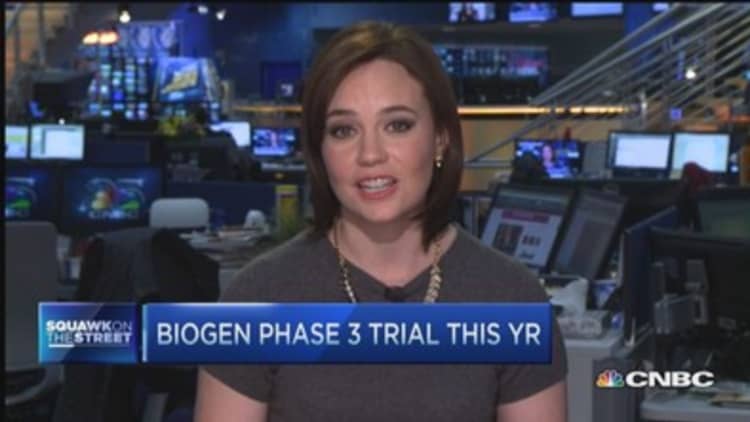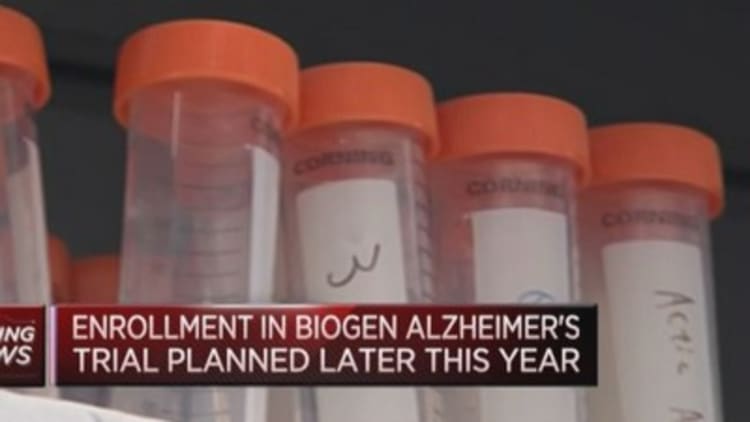
Biogen's stock surged Friday after the biotechnology company's experimental drug for Alzheimer's disease exceeded already high expectations in an early study.
The medicine, known as BIIB037, or aducanumab, showed both reductions in levels of the amyloid plaques in the brain associated with Alzheimer's, and a significant slowing of the disease's hallmark cognitive declines, Biogen reported at a conference in Nice, France.(Tweet This)
On one measure of cognition, known as CDR, for Clinical Dementia Rating, Biogen's drug showed a 71 percent reduction in declines on the highest dose. Analysts said they were looking for 20 percent to 30 percent reductions to qualify as a success.
"This is the first time an investigational drug for Alzheimer's disease has demonstrated a statistically significant reduction on amyloid plaque as well as a statistically significant slowing of clinical impairment in patients with prodromal or mild disease," Biogen Chief Medical Officer Dr. Al Sandrock said in a statement.
Read MoreBig Alzheimer's news from Biogen
The company said it's moving the drug into a late-stage study, with planned enrollment in the trial starting later this year. Even though there remains risks in the later stages of the drug's development, analysts expect that if all goes well, the drug could reach the market as early as 2018.
More than 5 million Americans are estimated to have Alzheimer's, a number that could triple by 2050, according to the Alzheimer's Association. It's the sixth-leading cause of death in the U.S.
Biogen's drug was tested in patients at earlier stages of the disease, as previous studies indicated that's when drugs aiming to clear amyloid plaques may be most helpful.
"Reactions to the clinical data ranged from 'encouraging but still early' to 'a game-changer,'" Wells Fargo analyst Brian Abrahams wrote in a Friday research note from the conference in Nice. "Bottom line, physicians seem encouraged by BIIB037's benefit/risk."
Read MoreRetirees may shell out $220K for health care
Expectations were sky-high leading into Friday's presentation; Biogen shares had gained 40 percent since the company shocked investors in December with initial positive results from the study. It was in the first phase of clinical trials, and the study's primary goal was to assess safety. So the stock shot up when Biogen presented initial signs of efficacy as well.
Biogen shares were trading at $461.88 late Friday morning, up more than 6 percent. (Click here to get a real-time stock quote.)
Potential for $10 billion in annual sales
Three analysts raised their price targets on the stock on the data: Robert W. Baird's Chris Raymond increased his to $498 from $445; Cowen's Eric Schmidt upped his to $500 from $425; and Citi's Yaron Werber raised his to $512 from $410. Analysts say the drug could draw $10 billion in annual sales if successful.
The analysis Friday included data on 166 patients up to 54 weeks, Biogen said. It presented the results at the International Conference on Alzheimer's and Parkinson's Diseases and Related Neurological Disorders.
Analysts were most impressed by the drug's effects on cognition. Biogen reported results on two measures: CDR and MMSE, or the mini mental state exam. Both are used as a way for physicians to gauge memory loss and other aspects of dementia. On the MMSE scale, patients taking placebo declined an average of 3.14 at one year, Biogen said. That compared with a decline of 0.75 in the 3 milligram per kilogram arm, and 0.58 in the 10 milligram per kilogram, both statistically significant.
Read MoreThis fast food ban hasn't cut obesity
On the CDR scale, patients on placebo declined by an average of 2.04 at one year, compared with 0.59 for the 10 milligram per kilogram group, also statistically significant, Biogen said.
The company also tested doses of 1 and 6 milligrams per kilogram; it didn't say the lowest dose reached statistical significance, and the 6 milligram per kilogram dose group had only showed 30 weeks of data.
Read MoreThis fast food ban hasn't cut obesity
"The reduction in the level of cognitive decline was higher than we had expected, strongly dose dependent, and exceeded the 20 to 30 percent hurdle rate we had previously suggested might be meaningful," Sanford C. Bernstein analyst Geoff Porges wrote in a Friday research note.
Reductions in amyloid plaques in the brain were also strong, analysts said, and increased with higher doses of the drug. The correlation of plaque clearing and cognitive benefits is particularly important, "supporting the hypothesis that clearing amyloid more effectively can truly improve cognition/function," Wells Fargo's Abrahams said.

Safety was key as well, and at its higher doses, the medicine did show signals analysts highlighted as a potential concern. The drug was primarily associated with a side effect known as ARIA, or amyloid-related imaging abnormalities, related to removal of amyloid plaques from the brain. Biogen said it "demonstrated an acceptable safety and tolerability profile in this analysis," and that ARIA-E (associated with edema, or blood vessels becoming leaky as plaques are removed) generally was seen early in treatment and showed only mild symptoms.
"The majority of patients with ARIA-E continued treatment and did so at a lower dose," Biogen said.
The side effect was seen more in patients with a gene known as ApoE4, associated with Alzheimer's disease. On the highest, 10 milligram per kilogram dose, 55 percent of ApoE4 carriers developed ARIA-E, Biogen said, versus 17 percent for noncarriers. Of patients who experienced ARIA-E on that dose, those who were ApoE4 carriers discontinued at a rate of 35 percent. Among noncarriers, that rate was 8 percent, Biogen said.
The study also showed patients on the drug had headaches more frequently; 22 percent for those receiving aducanumab versus 5 percent on placebo.
"Bottom line, the data, in our view, are even better than we had hoped," Baird's Raymond wrote in a research note. They were "well worth the wait."

